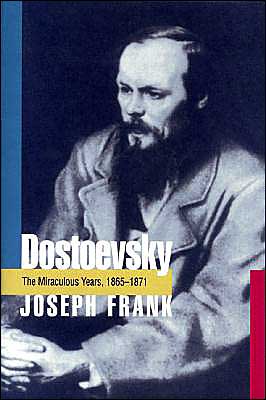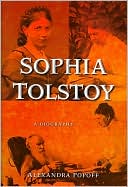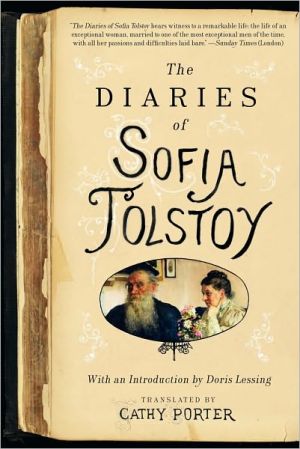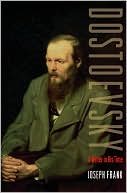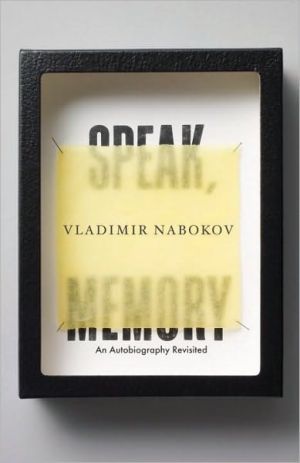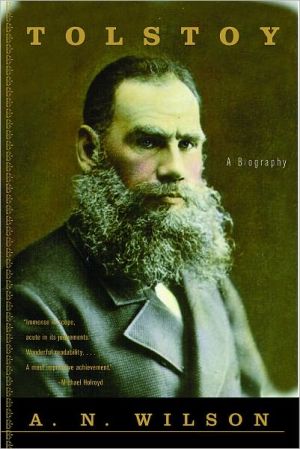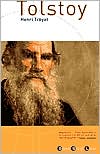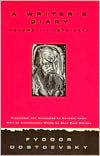Dostoevsky: The Miraculous Years, 1865-1871
This volume, the fourth of five planned in Joseph Frank's widely acclaimed biography of Dostoevsky, covers the six most remarkably productive years in the novelist's entire career. It was in this short span of time that Dostoevsky produced three of his greatest novels—Crime and Punishment, The Idiot, and The Devils—and two of his best novellas, The Gambler and The Eternal Husband. All these masterpieces were written in the midst of harrowing practical and economic circumstances, as Dostoevsky...
Search in google:
This volume, the fourth of five planned in Joseph Frank's widely acclaimed biography of Dostoevsky, covers the six most remarkably productive years in the novelist's entire career. It was in this short span of time that Dostoevsky produced three of his greatest novels--Crime and Punishment, The Idiot, and The Devils--and two of his best novellas, The Gambler and The Eternal Husband. All these masterpieces were written in the midst of harrowing practical and economic circumstances, as Dostoevsky moved from place to place, frequently giving way to his passion for roulette. Having remarried and fled from Russia to escape importuning creditors and grasping dependents, he could not return for fear of being thrown into debtor's prison. He and his young bride, who twice made him a father, lived obscurely and penuriously in Switzerland, Germany, and Italy, as he toiled away at his writing, their only source of income. All the while, he worried that his recurrent epileptic attacks were impairing his literary capacities. His enforced exile intensified not only his love for his native land but also his abhorrence of the doctrines of Russian Nihilism--which he saw as an alien European importation infecting the Russian psyche. Two novels of this period were thus an attempt to conjure this looming spectre of moral-social disintegration, while The Idiot offered an image of Dostoevsky's conception of the Russian Christian ideal that he hoped would take its place. Publishers Weekly This fourth installment in Frank's acclaimed, projected five-volume biography presents an astonishingly vivid, uncanny portrait of Dostoevsky's spiritual, emotional and artistic development during his crucial years abroad. Marrying his pert, reserved stenographer, Anna Grigoryevna Snitkina (his first wife died in 1864), Dostoevsky fled Russia with her in 1867 to escape harassing creditors and grasping dependents. Their obscure, lonely existence in Germany, Switzerland and Italy, until their return to Russia in 1871, was punctuated by the tragic death of their first child, Sofya, who lived only two months; by the penurious writer's frequent, disabling epileptic fits; by his mania for gambling; and by a stormy meeting with liberal, pro-Western Turgenev in Baden-Baden. The miracle implied by the book's title is that during this period, Dostoevsky wrote three major novels-Crime and Punishment, The Idiot and The Devils-plus two novellas, The Gambler and The Eternal Husband. Frank anchors the prophetic writer in his social and cultural milieu, tracing his struggles against Russian nihilists, his expos of the pitfalls of revolutionary politics, his messianic nationalism and his vision of an authentic Russian culture rooted in Christian morality and mystical union with the soil. (Feb.)
\ The [London] Times[Dostoevsky] is the genius who has done the most to illumine nineteenth-century Russian psychology and to make the terrifying problems of atheism and nihilism part of the modernism we still grapple with. Frank's magisterial five-volume study of his life and work ... salutes the grandeur of Dostoevsky's project.\ — Lesley Chamberlain\ \ \ \ \ The New York Review of BooksIn his aim of elucidating the setting within which Dostoevsky wrote-personal on the one hand, social, historical, cultural, literary, and philosophical on the other-Frank has succeeded triumphantly.\ — J. M. Coetzee\ \ \ The New York Times Book Review[Frank's] high contribution is to chronicle the life and elaborate the social-political-cultural matrix in which to consider the writings, and to do this more thoroughly and comprehensively than has been previously done.\ — Stephen Jan Parker\ \ \ \ \ Washington Post Book WorldFor a reader ready to grapple with the most powerful ideas and feelings in Dostoevsky's extraordinary life and work, this book is a godsend.\ \ \ \ \ The [London] Times[Dostoevsky] is the genius who has done the most to illumine nineteenth-century Russian psychology and to make the terrifying problems of atheism and nihilism part of the modernism we still grapple with. Frank's magisterial five-volume study of his life and work ... salutes the grandeur of Dostoevsky's project.\ \ \ \ \ The New York Review of BooksIn his aim of elucidating the setting within which Dostoevsky wrote-personal on the one hand, social, historical, cultural, literary, and philosophical on the other-Frank has succeeded triumphantly.\ \ \ \ \ The New York Times Book Review[Frank's] high contribution is to chronicle the life and elaborate the social-political-cultural matrix in which to consider the writings, and to do this more thoroughly and comprehensively than has been previously done.\ \ \ \ \ The "Washington Post Book World in Weil\ For a reader ready to grapple with the most powerful ideas and feelings in Dostoevsky's extraordinary life and work, this book is a godsend.\ \ \ \ \ The New York Times Book Review\ [Frank's] high contribution is to chronicle the life and elaborate the social-political-cultural matrix in which to consider the writings, and to do this more thoroughly and comprehensively than has been previously done.\ — Stephen Jan Parker\ \ \ \ \ The New York Review of Books\ In his aim of elucidating the setting within which Dostoevsky wrote-personal on the one hand, social, historical, cultural, literary, and philosophical on the other-Frank has succeeded triumphantly.\ — J. M. Coetzee\ \ \ \ \ The [London] Times\ [Dostoevsky] is the genius who has done the most to illumine nineteenth-century Russian psychology and to make the terrifying problems of atheism and nihilism part of the modernism we still grapple with. Frank's magisterial five-volume study of his life and work ... salutes the grandeur of Dostoevsky's project.\ — Lesley Chamberlain\ \ \ \ \ Publishers WeeklyThis fourth installment in Frank's acclaimed, projected five-volume biography presents an astonishingly vivid, uncanny portrait of Dostoevsky's spiritual, emotional and artistic development during his crucial years abroad. Marrying his pert, reserved stenographer, Anna Grigoryevna Snitkina his first wife died in 1864, Dostoevsky fled Russia with her in 1867 to escape harassing creditors and grasping dependents. Their obscure, lonely existence in Germany, Switzerland and Italy, until their return to Russia in 1871, was punctuated by the tragic death of their first child, Sofya, who lived only two months; by the penurious writer's frequent, disabling epileptic fits; by his mania for gambling; and by a stormy meeting with liberal, pro-Western Turgenev in Baden-Baden. The miracle implied by the book's title is that during this period, Dostoevsky wrote three major novels-Crime and Punishment, The Idiot and The Devils-plus two novellas, The Gambler and The Eternal Husband. Frank anchors the prophetic writer in his social and cultural milieu, tracing his struggles against Russian nihilists, his expos of the pitfalls of revolutionary politics, his messianic nationalism and his vision of an authentic Russian culture rooted in Christian morality and mystical union with the soil. Feb.\ \ \ \ \ Library JournalThe three previous volumes of Frank's biography The Seeds of Revolt, 1821-1849, LJ 9/1/76; The Years of Ordeal, 1850-1859, LJ 11/15/83; and The Stir of Liberation, 1860-1865, LJ 3/15/87 have received high praise as well as prestigious awards, and the current volume merits similar reception. Frank has aimed to keep Dostoevsky's works "constantly in the foreground...rather than accessory to the life...to furnish the reader with a context, drawn from the writer's personal life, as well as from the social, cultural, literary, and philosophical background... that will help toward a better understanding of the work." This he has done for the period in which Dostoevsky produced three major novels Crime and Punishment, The Idiot, The Devils and two novellas that rank among his best. With admirable balance and lucidity, Frank delineates the trying personal circumstances poverty, the death of his first child, his gambling mania as well as the influence of currents such as Russian nihilism on the works as they developed in Dostoevsky's notebooks. A rich and worthwhile biography for scholar and general reader alike.-Richard Kuczkowski, Dominican Coll., Blauvelt, N.Y.\ \
